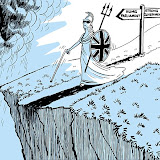Why Cameron would love to be Maltese I cannot help wondering how David Cameron must wish that he was a Maltese politician. Rather than sitting at the negotiating table with that pesky Nick Clegg (the tiddler that he is) he’d be sitting firmly, decisively and stably at the head of some...
Gurnalizmu fuq Kollo...
posted by Jacques René Zammit
Some time ago J’accuse commented on how Bondi’s programme Bondiplus represented the death of investigative journalism. Only last week we pointed out the incongruency of the next programme planned by Lou – with Norman Lowell as guest. So. Is it still Gurnalizmu fuq Kollox?...
Frankly it's Fr...
posted by Jacques René Zammit
The debate in parliament has begun in earnest and the Times of Malta reports Franco Debono’s intervention. The young (no longer youngest) nationalist parliamentarian is busy calling a spade a spade and exploring possibilities of what could have been done and what can be done....
Hang On – UK e...
posted by Jacques René Zammit
It’s the last day before voting day and the three main parties in the UK have unleashed their last attempts to lure voters to their fold. Or should it be to scare voters away from their opponents’ fold? The Fear Factor, redolent of the Top Trumps Horror Series, has become a major...
The Digital Election
posted by Jacques René Zammit
Still observing the UK Election from the Web angle. J’accuse brings you another possible tool – direct Q&A with the leaders. Of course this entails meeting the leaders of the political parties and that means that they have to accept answering questions but just look at what the...

